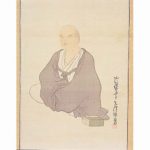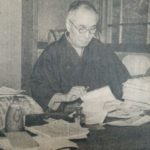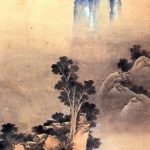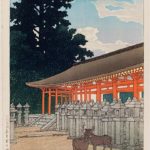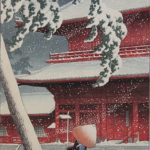Table of Contents
Japanese 5-7-5 winter haiku to English three line
In the old Japanese where heating equipment was poor than it is now, the coldness in winter was so strict for people. How did the haiku poets express the season?
Kobayashi Issa(1763-1828)
<Japanese>
ともかくも あなたまかせの 年の暮れ
Tomo-kakumo/ Anata makase no/ Toshi no kure
<English>
At any rate,
I leave entirely up to you
At the the year-end.
<Japanese>
椋鳥と 人に呼ばるる 寒さかな
Mukudori to/ Hito ni yobaruru/ Samusa kana
<English>
“You are a gray starling”
I’m called by people.
It makes me feel cold.
*In Edo Period, the resident of the capital (Edokko) teased an unpolished man who came from the country as “a gray starling”. That is why the bird has the unclear voice and boring color of feather.
<Japanese>
これがまあ 終のすみかか 雪5丈
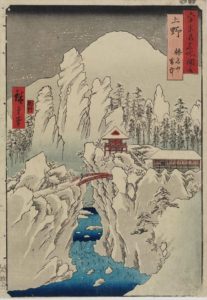
Kore ga maa/ Tsui no sumika ka/ Yuki gojo
<English>
Well, this is
My final abode.
The snow lay 15 meter.
Yosa Buson(1716-1784)
<Japanese>
宿かせと 刀投げ出す 吹雪かな
Yado kase to/ Katana nagedasu/ Fubuki kana
<English>
“Put me up for a night!”
He threw the katana.
It is a snow storm.
<Japanese>
斧入れて 香おどろくや 冬木立
Ono ire te/ Ko odoroku ya/ Fuyu kodachi
<English>
Cutting into with the ax,
I was surprised at the scent of.
The winter trees.
Masaoka Shiki(1867-1902)
<Japanese>
寒さうに 母の寝給う 布団哉
Samusou ni/ Haha no netamou/ Futon kana
<English>
It seems as cold,
My mother has a sleep
In the futon.
<Japanese>
面白や かさなりあふて 雪の傘
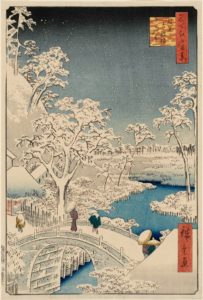
Omoshiro ya/ Kasanari oute/ Yuki no kasa
<English>
It’s interesting.
Lied one upon another
The unbrellas in the snow.
<Japanese>
土ともに 崩るる崕の 霜柱
Tsuchi tomoni/ Kuzururu gake no/ Shimo-bashira
<English>
With the mad,
Collapsed on the scarp,
The frost columns.
Takahama Kyoshi(1874-1959)
<Japanese>
かわかわと 大きくゆるく 寒鴉
Kawa kawa to/ Ookiku yuruku/ Samu-garasu
<English>
“Cawa-cawa”
In a large and loose way,
The winter crow.
<Japanese>
落葉焚いて 小春の日和 定まりぬ
Ochiba taite/ Koharu no hiyori/ Sadamarinu
<English>
Burning the fallen leaves,
The warm winter day is
A certainly..
Murakami Kijo(1865-1938)
<Japanese>
冬蜂の 死にどころなく 歩きけり
Fuyu-bachi no/ Shini-dokoro naku/ Aruki keri
<English>
The winter bee
Couldn’t find the place to die,
And it walks.
<Japanese>
道あるに 雪の中行く 童かな
Michi aruni/ Yuki no naka yuku/ Warabe kana
<English>
Although there is the road,
The child walks
In the snow.
Iida Dakotsu(1885-1962)
<Japanese>
冬ひと日 うれひある身の 花を提ぐ
Fuyu hito hi/ Urei aru mi no/ Hana wo sagu
<English>
The winter day,
One with sorrow
Carries a flower in the hand.
<Japanese>
冬の富士 日星おほらかに 又きびし
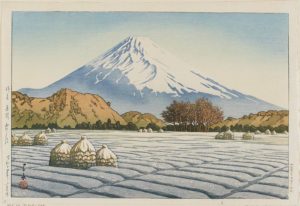
Fuyu no fuji/ Jissei oorakani/ Mata kibishi
<English>
Mount Fuji in winter.
The sun and stars are big‐hearted
And strict.
<Japanese>
冬もみぢ 端山の草木 禽啼かず
Fuyu-momiji/ Hayama no kusaki/ Tori nakazu
<English>
The left behind winter red leaves,
The plants of foothill,
The birds don’t make a sound.
See also
Haiku poems of winter. The examples by Matsuo Basho
Haiku poems about Christmas by Japanese famous poets
Back to the page of “Haiku poem’s definition, examples and format(Japanese and English)”

